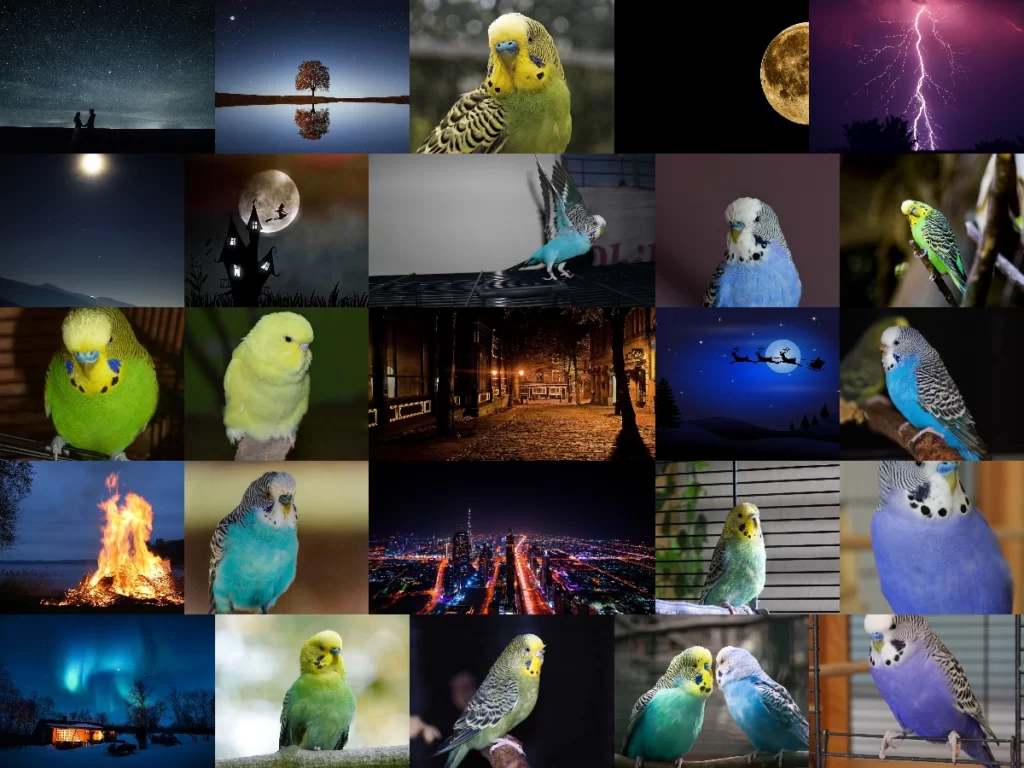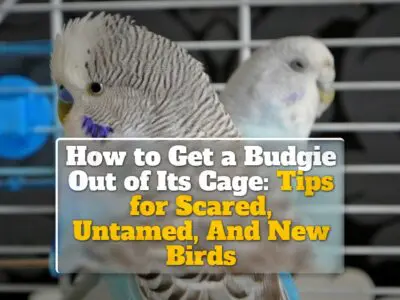Night fright in budgies is a panic-induced behavior often triggered by darkness or sudden changes in their environment at night.
The cause can range from sudden noises, shadows, to intrinsic factors like health conditions. Budgies get scared at night due to their poor night vision, making them more susceptible to fear and stress.
For all you budgie owners who have noticed your feathered friends exhibiting signs of fear during the night, this piece will shed light on what night fright is and why it happens.
As a former budgie owner and animal lover, my understanding and experiences with this unsettling condition have inspired me to share this knowledge.
This guide will aid you in discerning night fright in your budgies, understanding its causes, and will provide you with insights to help mitigate this distressing experience for your little companions.

Understanding Budgies and their Behavior
Just like us, our feathered companions have their own unique habits and routines. Budgies, also known as budgerigars, are particularly known for their strict sleep schedules.
Typically, these little avian friends need between 10-12 hours of sleep per night, ideally coinciding with natural light-dark cycles.
Budgies rely heavily on this sleep pattern and are quite sensitive to disruptions. They sleep soundly in quiet and dark environments, keeping their bodies close to the perch with one leg tucked up under their body.
Unusual disturbances in this tranquil routine may lead to stressful situations, causing our budgies to react in ways we might find perplexing.
Defining Night Fright in Budgies
Among these perplexing behaviors is a condition known as night fright. Night fright, as the name suggests, is a state of sudden panic that budgies can experience in the night.
This generally presents as frantic flapping, flying blindly into the cage sides, or falling off perches.
To draw a parallel to behaviors seen in our feline friends, night fright in budgies is somewhat akin to when cats are startled by sudden noises and dart about in a frenzied manner.
The difference lies in the potential severity. While a startled cat will eventually calm down, a budgie experiencing night fright might injure itself, given the confined space of their cage.
As far as frequency is concerned, night fright isn’t a daily ordeal. However, it’s not extremely rare either.
It tends to occur sporadically and can be quite jarring for both the bird and the owner when it happens.
Causes of Night Fright in Budgies
Night fright can be triggered by a variety of factors. Often, it’s sudden noises, movements, or changes in light that may startle these delicate creatures during their sleep, causing an episode of night fright.
Even something as benign as a shifting shadow or a slight rustling can cause panic.
Remember, birds are naturally alert and sensitive creatures. Their instincts for flight are strong, and these can kick in even when they are in the safety of their own cages.
1. Poor Lighting Conditions
The absence or sudden shift of light can cause significant disorientation and panic in budgies.
As prey animals in the wild, these small parrots have highly tuned senses to detect potential dangers.
Darkness can stimulate a powerful fear response in them, leading to distress and night frights.
To alleviate these issues, consider implementing practical solutions like using nightlights or ensuring gradual changes in lighting conditions.
The aim is to simulate the natural dusk and dawn transitions that budgies would experience in the wild, thereby reducing the stress associated with sudden darkness.
2. Disturbance during Sleep
A peaceful and undisturbed sleep is crucial for your budgie’s overall health and wellbeing.
However, sudden movements or loud noises in the budgie’s environment can startle them awake, leading to panic and potential night frights.
Whether it’s the sound of a loud television or another pet causing a commotion, such disturbances can be highly stressful.
Minimizing such disturbances, particularly during their sleep time, is essential for their peaceful slumber and reducing the incidence of night frights.
3. Cage Placement Issues
The location of your budgie’s cage can significantly influence its anxiety levels.
For instance, if the cage is placed close to a window, your budgie may feel threatened by potential predators outside.
Similarly, if the cage is located in a high-traffic area of your home or is exposed to drafts, it can trigger anxiety in your budgie.
To ensure the cage placement doesn’t contribute to night frights, select a quiet, draft-free part of your home that offers a secure and peaceful environment.
4. Incorrect Cage Setup
The setup of your budgie’s cage is vital for their sense of security.
Factors such as safe and comfortable perches, sufficient hiding spots, and enough space to move around can greatly reduce stress levels.
An incorrect cage setup can lead to an anxious and frightened budgie, particularly during the dark when their visibility is reduced.
Therefore, it’s important to create a safe, comfortable, and spacious cage environment that caters to the natural behavior and needs of your budgie.
5. Lack of Routine
Budgies are creatures of habit that thrive on consistency.
Regular routines provide them with a sense of security, while disruptions in their daily activities can lead to anxiety and night frights.
For instance, sudden changes in feeding or playtimes can upset them.
Therefore, maintaining a consistent daily routine is key to ensuring that your budgie feels secure, which can significantly help reduce night fright incidents.
6. Illness or Injury
Night frights could sometimes be a sign of underlying health issues.
If your budgie is reacting to pain or discomfort from an illness or injury, their stress levels can elevate, leading to episodes of panic during the night.
If your budgie is showing other signs of sickness, such as changes in appetite or unusual behavior, it’s imperative to consult with a veterinarian to address any potential health problems.
7. Age or Youth
Young and older budgies may be more prone to night frights due to different reasons.
Young budgies may still be adapting to their environment and thus easily startled, while older ones may experience a deterioration of senses, increasing their vulnerability to night frights.
Providing extra care and attention to budgies in these age groups, including frequent vet check-ups for older ones, can help alleviate these issues.
8. Previous Trauma
Budgies, like humans, can carry the psychological scars of past traumas.
These traumas can lead to heightened anxiety and increased susceptibility to night frights.
A budgie that has had a negative experience in the past might be more fearful, particularly in the dark.
Helping a budgie overcome past trauma requires patience, empathy, and time, but can significantly improve their overall sense of security and wellbeing.
9. Change in Environment
Significant changes in a budgie’s surroundings or routine can induce stress and result in night frights.
Moving houses or introducing a new pet are examples of such changes that can upset your budgie.
During such transitions, maintaining elements of their routine as much as possible and providing extra care can help your budgie navigate the changes more comfortably, reducing the likelihood of night frights.
Symptoms of Night Fright in Budgies
How can you, as a concerned budgie owner, recognize an episode of night fright? The observable signs and symptoms can vary, but they often include wild flapping noises, a scattering of feathers across the cage, or even signs of injury like blood stains.
The bird may also appear visibly distressed, often panting heavily and appearing wide-eyed.
During a night fright episode, expect your budgie to behave quite erratically. The typically gentle and social bird might become uncharacteristically frantic, dashing around the cage and knocking into cage accessories.
This, unfortunately, could lead to self-injury, further exacerbating the situation.
Impact of Night Fright on Budgies
The impact of night fright on a budgie’s health and wellbeing can be substantial. It’s not just the immediate physical harm they might suffer from frantic flapping and potential collisions.
Repeated episodes of night fright can lead to prolonged stress and anxiety, potentially weakening their immune system and making them more susceptible to illnesses.
Even their typically bright and playful personalities can take a hit, leading to lessened social interaction and overall mood changes.
Managing and Reducing Night Fright in Budgies
Now that we understand the challenge, what can we do to help our avian friends?
A critical first step during a night fright episode is to calm the budgie down.
You can do this by gently talking to your bird in a soothing tone, turning on a dim light to remove the frightening shadows, and, if necessary, carefully removing them from their cage to a safe and quiet place until they settle.
The role of the cage environment cannot be stressed enough. The location, size, and accessories of the cage can all contribute to reducing night fright.
Position the cage in a quiet area, away from high traffic or noisy appliances. The cage should be large enough for your budgie to move comfortably, without any sharp or hazardous accessories that could cause injury during an episode.
Some budgie owners find that leaving a night light on or covering the cage partially can provide a sense of safety.
The importance of maintaining a clean environment for budgies becomes even more pronounced when considering the potential risk of night fright.
An opinion/commentary paper (archived) from Hamilton Aviary points out that a lack of cleanliness can lead to an increase in rodents, which can cause sudden fright in birds sleeping in darkness.
This sudden fear can trigger the birds to fly blindly, potentially leading to self-injury or a “domino effect” of panic throughout the aviary.
Interestingly, the paper also mentions the use of low-level night lighting as a preventative measure against night fright, though it’s important to note that this could potentially interfere with a bird’s natural photoperiodism.
These findings underscore the complex interplay of factors involved in managing and reducing night fright in budgies.
What to Do When Budgie Night Fright Persists
Persistent night fright can be distressing for both you and your budgie. If you’re noticing a pattern of recurring night fright episodes, it’s time to consult a veterinarian.
They can offer guidance based on the specific circumstances and needs of your budgie.
During a vet visit for night fright, expect a thorough examination of your budgie and possibly some tests to rule out underlying health issues.
The vet might also ask you about your budgie’s environment, diet, and routine to identify potential triggers.
In terms of treatments or interventions, it could range from environmental modifications, dietary changes, to even prescribed medication in severe cases.
It’s essential to follow the vet’s advice and remember that each budgie is unique, so what works for one might not work for another.
Managing a budgie that frequently experiences night fright might require patience and a gentle touch.
But with proper guidance and a lot of love, your little feathered friend can lead a happy and fulfilling life.
After all, as a bird lover, their happiness is what truly matters to us.
Faqs
Can Budgies Die from Night Fright?
While it’s rare, severe instances of night fright could potentially lead to fatal injuries, especially if a budgie panics and injures itself inside the cage.
Does Night Fright in Budgies Occur More Frequently in Certain Seasons?
No, there isn’t a specific season that increases the frequency of night fright in budgies.
However, it’s important to note that sudden changes in temperature, especially at night, could potentially trigger stress in budgies leading to night fright.
Can Budgies Overcome Night Fright Over Time?
While some budgies may adjust to their environments and experience fewer instances of night fright over time, others may continue to be affected.
This can depend on the individual bird’s personality, health status, and the overall quality of their environment.
Does the Age of a Budgie Influence the Occurrence of Night Fright?
The age of a budgie may influence the occurrence of night fright to some extent. Younger budgies may be more prone to night fright due to their lack of experience and understanding of their environment.
However, it can occur in budgies of all ages.
Is There a Difference in Night Fright Occurrence Between Wild and Domestic Budgies?
Night fright is more commonly observed in domestic budgies as wild budgies are naturally more adapted to dealing with environmental changes.
Domestic budgies are not typically exposed to the same variety of stimuli as their wild counterparts, which may make them more susceptible to night fright.
Are Certain Budgie Breeds More Prone to Night Fright?
Night fright in budgies is not breed-specific. It can occur in any budgie, regardless of breed, based on a variety of factors such as changes in the environment, stress levels, and individual health conditions.
Can Night Fright in Budgies be Prevented?
While night fright in budgies cannot be completely prevented, you can manage and reduce the frequency of episodes.
Keeping your budgie’s cage in a quiet, dimly lit area at night, avoiding sudden environmental changes, and maintaining a consistent routine can help.
How Can I Comfort My Budgie During a Night Fright Episode?
You can comfort your budgie during a night fright episode by gently speaking to them in a calm voice to reassure them.
Try to minimize any additional stimuli and provide a soft, dim light source. However, avoid handling your budgie unless necessary, as this may increase their stress.
Is Night Fright Common in Other Birds Besides Budgies?
Night fright is not exclusive to budgies and can occur in other species of pet birds as well.
Factors like sudden changes in the environment, noises, and other disturbances can trigger night fright in various bird species.


